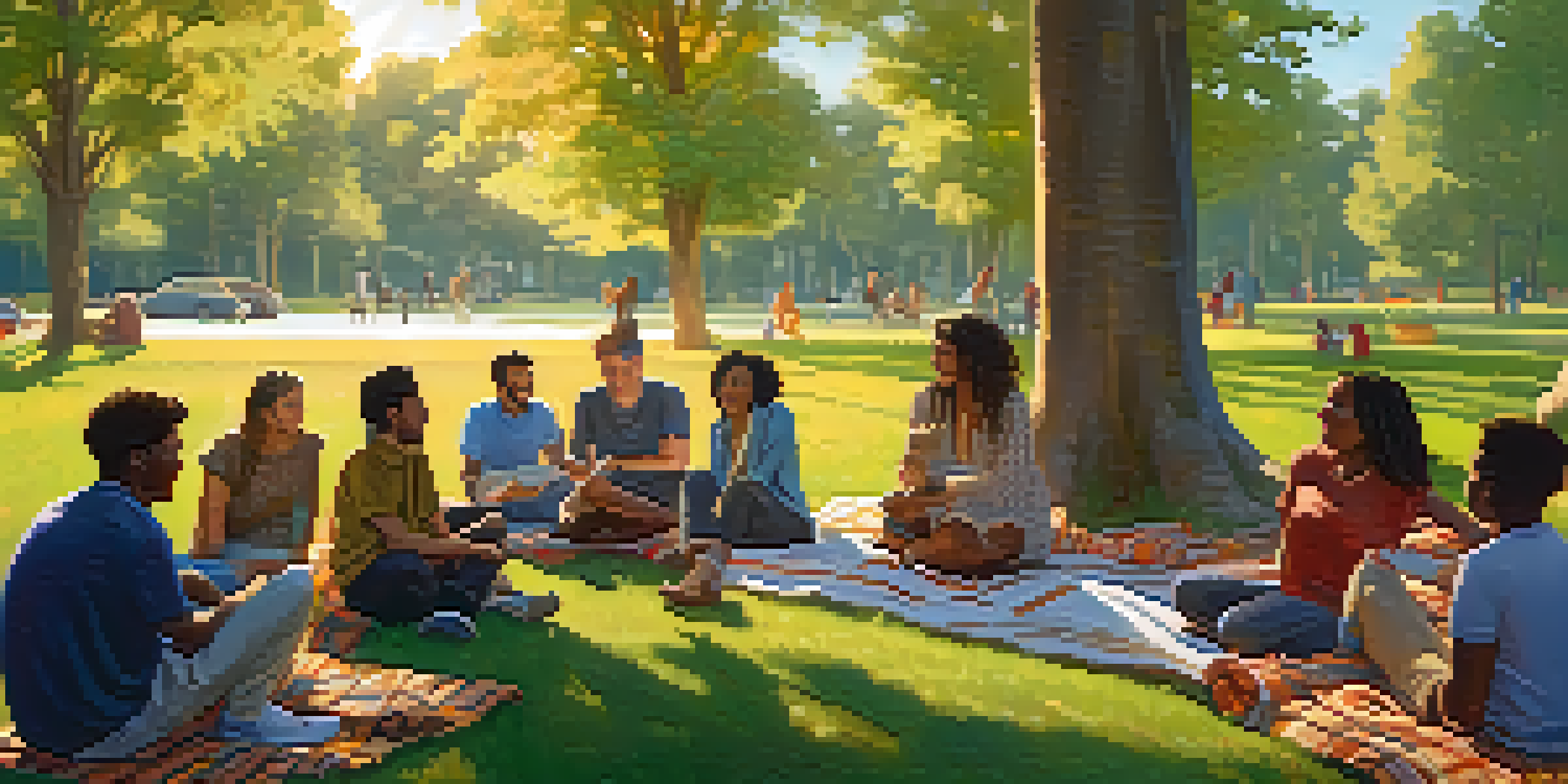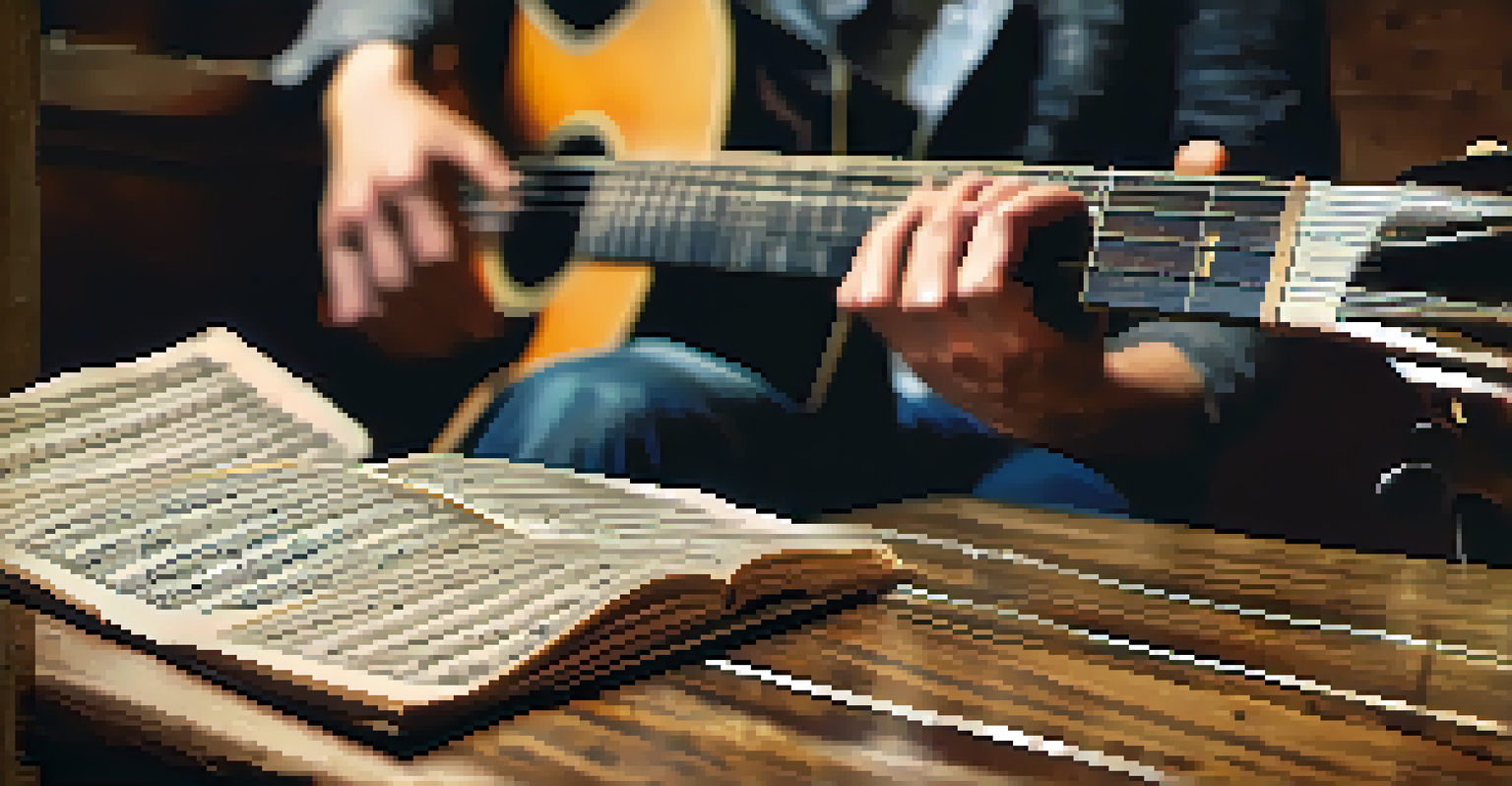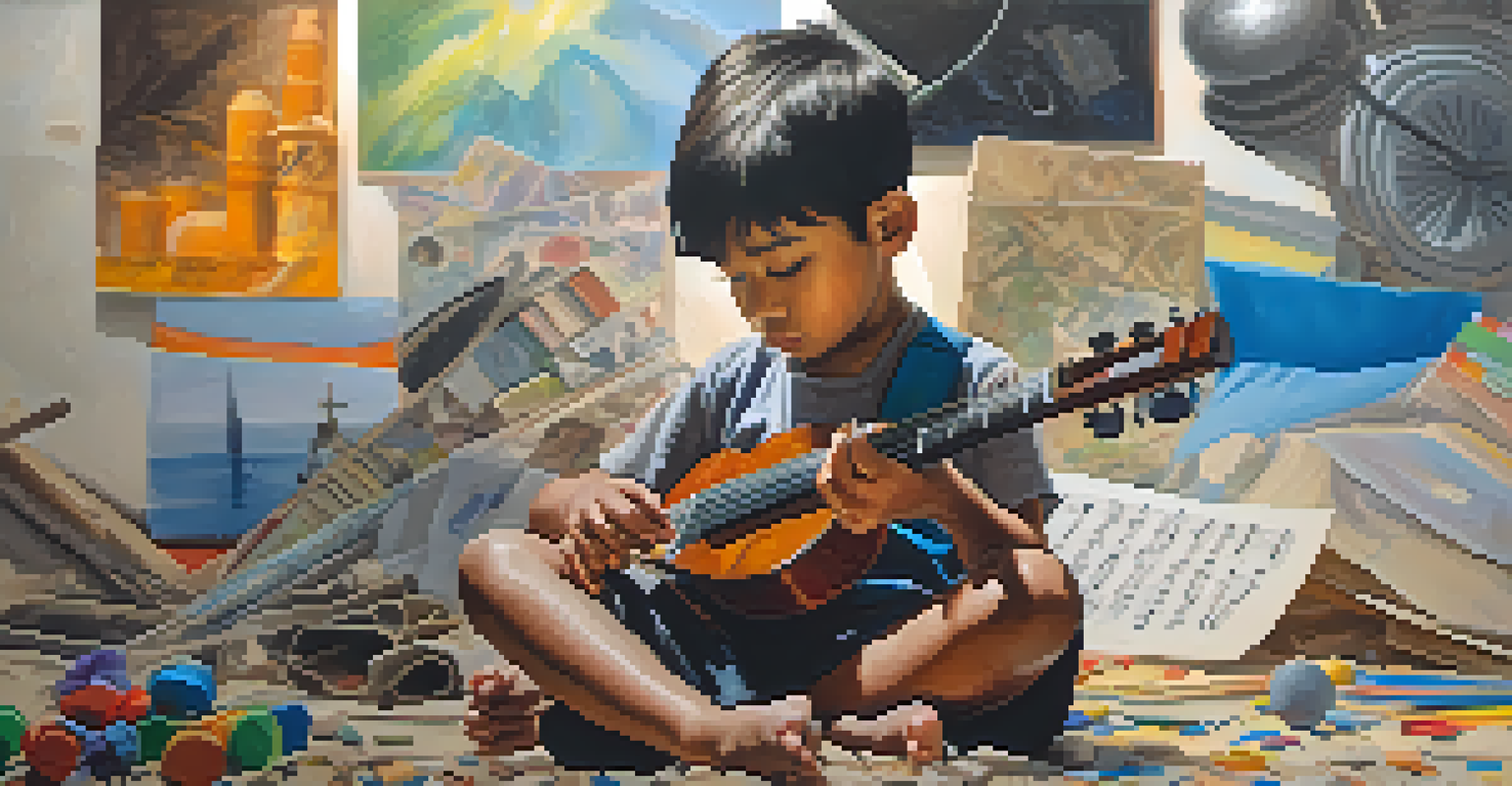The Impact of Music on Emotional Well-being During Conflict

Understanding Music's Emotional Power in Conflict
Music has a unique ability to connect with our emotions, often serving as a reflection of our inner feelings. During times of conflict, whether personal or societal, music can amplify our experiences, providing comfort or even a means of expression. This emotional power is rooted in the way music can evoke memories and feelings, allowing individuals to process complex emotions.
Music can change the world because it can change people.
For instance, a soothing ballad can bring solace to someone feeling overwhelmed by stress, while an upbeat song might energize and inspire hope. The lyrics and melodies often resonate deeply, making listeners feel understood and less isolated in their struggles. This connection to music can be particularly vital during turbulent times when emotions run high.
Moreover, the universality of music means it transcends cultural barriers, uniting people through shared experiences. This shared experience can foster a sense of community, helping individuals feel less alone during conflicts, whether they are experiencing war, personal loss, or societal upheaval.
Historical Examples of Music's Role in Conflict
Throughout history, music has often played a pivotal role in times of conflict. From protest songs during the Civil Rights Movement to wartime anthems, music has been a powerful tool for both rallying support and expressing dissent. These songs not only document the struggles of their times but also uplift and unite those facing adversity.

For example, Bob Dylan's 'The Times They Are a-Changin'' became an anthem for change, reflecting the hopes and frustrations of a generation. Similarly, during World War II, soldiers used music to maintain morale, creating a sense of camaraderie and hope amidst the chaos of war. These examples illustrate how music serves as both a historical record and a source of emotional strength.
Music Amplifies Emotional Connection
During conflicts, music serves as a powerful tool for expressing and processing complex emotions, helping individuals feel understood and less isolated.
In more recent conflicts, we see the same patterns emerge. Music remains a vital outlet for those affected by war, with artists using their platforms to voice the pain and resilience of their communities. This historical context shows that music is not just entertainment; it's a crucial component of emotional survival during conflict.
The Therapeutic Benefits of Music During Conflict
Music therapy has emerged as a powerful tool for enhancing emotional well-being, especially during times of conflict. This therapeutic approach uses music to address physical, emotional, and social needs, helping individuals cope with trauma and stress. By engaging with music actively or passively, people can express feelings that are often hard to articulate.
Where words fail, music speaks.
Research has shown that listening to music can lower anxiety, improve mood, and even reduce feelings of pain. For example, in conflict zones, music therapy has been used to aid children dealing with trauma, allowing them to express their experiences in a safe environment. This therapeutic practice highlights music's ability to heal and support emotional resilience.
Additionally, creating music—whether through songwriting or playing an instrument—provides a constructive outlet for pent-up emotions. It encourages individuals to process their feelings, fostering a sense of agency and control during chaotic times. This blend of expression and healing reinforces the idea that music is much more than mere entertainment; it's a lifeline.
The Role of Music in Community Building During Conflict
In times of conflict, music often acts as a glue that binds communities together. It creates shared experiences that foster unity and solidarity, making individuals feel part of something larger than themselves. Community gatherings centered around music can be a source of strength and resilience, providing emotional support and encouragement.
Consider festivals, concerts, or even informal gatherings where music is played; these events can help people come together to share their stories and struggles. In many cultures, traditional songs and dances serve as a reminder of heritage and identity, reinforcing bonds through shared history. This communal aspect of music can be particularly uplifting in times of division.
Historical Role of Music in Conflict
Music has historically played a crucial role in conflicts, acting as both a rallying cry and a source of emotional strength for those facing adversity.
Moreover, collaborative music projects often emerge in conflict situations, allowing individuals from different backgrounds to work together towards a common goal. These initiatives not only promote healing but also encourage dialogue and understanding among diverse groups. In essence, music serves as a bridge, connecting people across divides and fostering a sense of belonging.
The Influence of Music Genres on Emotional Responses
Different music genres elicit various emotional responses, which can play a significant role during conflicts. For instance, classical music might evoke a sense of calm and reflection, while rock or hip-hop can inspire feelings of empowerment and resistance. Understanding these emotional triggers can help individuals choose music that best suits their needs during challenging times.
Take, for example, the impact of protest music genres like folk or punk; these styles often carry strong political messages that resonate with listeners’ frustrations and desires for change. By tapping into these emotions, artists can mobilize communities and inspire action. This illustrates how genre-specific music can serve as both a coping mechanism and a rallying cry.
Furthermore, individuals may gravitate towards particular genres based on their cultural backgrounds, personal experiences, or current emotional states. This personal connection to music is vital during conflict, as it allows individuals to tailor their listening experiences to their unique circumstances, ultimately fostering emotional well-being.
The Healing Power of Lyrics in Times of Conflict
Lyrics often carry profound meanings that can resonate deeply with listeners, especially during conflict. Well-crafted lyrics can articulate feelings of pain, loss, hope, and resilience, providing a sense of validation for those experiencing similar emotions. This lyrical connection can be incredibly comforting in times of turbulence, helping individuals feel understood.
For instance, many artists write songs that reflect their personal experiences during conflict, providing listeners with a shared narrative. When someone hears a song that perfectly captures their struggles, it can be a powerful reminder that they are not alone. This validation can be crucial for mental and emotional well-being during difficult times.
Music as a Community Builder
In turbulent times, music fosters unity and solidarity within communities, creating shared experiences that promote healing and understanding.
Moreover, engaging with lyrics can spark reflection and dialogue, encouraging listeners to explore their feelings more deeply. This exploration can lead to greater self-awareness and healing, highlighting how lyrics serve as more than just words; they can be a pathway to emotional understanding and growth.
Looking Ahead: Music's Future Role in Conflict Resolution
As we look towards the future, the role of music in conflict resolution appears promising and multifaceted. Initiatives that incorporate music into peacebuilding efforts are gaining traction, recognizing its ability to heal wounds and foster understanding among divided communities. These programs often focus on collaboration, using music to bridge gaps and create dialogue.
Furthermore, advancements in technology have made music more accessible than ever, allowing individuals to share their stories and experiences through online platforms. This democratization of music can empower marginalized voices, ensuring a diverse range of perspectives is heard in times of conflict. The more we embrace this potential, the more we can harness music for social change.

In essence, the future of music in conflict resolution is not just about addressing existing issues; it's about creating a culture of empathy and understanding. By continuing to explore the intersection of music and emotional well-being, we can pave the way for a more harmonious world, where music serves as a catalyst for healing and connection.